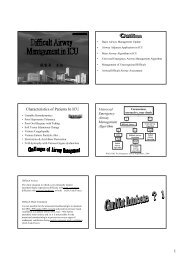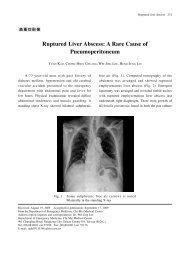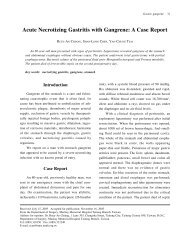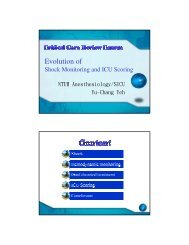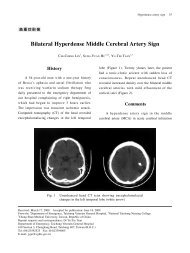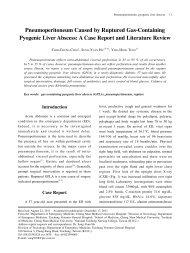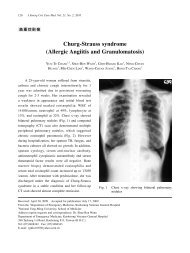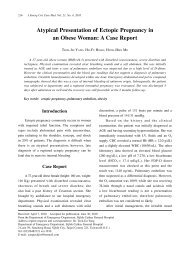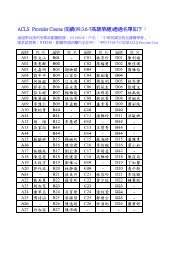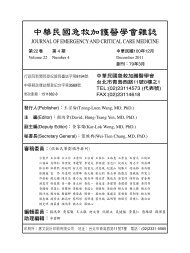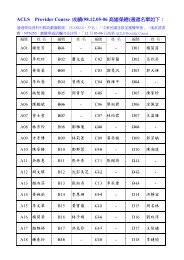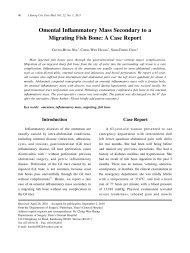2010 American Heart Association
2010 American Heart Association
2010 American Heart Association
You also want an ePaper? Increase the reach of your titles
YUMPU automatically turns print PDFs into web optimized ePapers that Google loves.
S930 Circulation November 2, <strong>2010</strong><br />
169. Woollard M, Whitfield R, Newcombe RG, Colquhoun M, Vetter N,<br />
Chamberlain D. Optimal refresher training intervals for AED and CPR<br />
skills: a randomised controlled trial. Resuscitation. 2006;71:237–247.<br />
170. Duran R, Aladag N, Vatansever U, Kucukugurluoglu Y, Sut N, Acunas<br />
B. Proficiency and knowledge gained and retained by pediatric residents<br />
after neonatal resuscitation course. Pediatr Int. 2008;50:644–647.<br />
171. Anthonypillai F. Retention of advanced cardiopulmonary resuscitation<br />
knowledge by intensive care trained nurses. Intensive Crit Care Nurs.<br />
1992;8:180–184.<br />
172. Boonmak P, Boonmak S, Srichaipanha S, Poomsawat S. Knowledge and<br />
skill after brief ACLS training. J Med Assoc Thai. 2004;87:1311–1314.<br />
173. Kaye W, Wynne G, Marteau T, Dubin HG, Rallis SF, Simons RS, Evans<br />
TR. An advanced resuscitation training course for preregistration house<br />
officers. J R Coll Physicians Lond. 1990;24:51–54.<br />
174. Skidmore MB, Urquhart H. Retention of skills in neonatal resuscitation.<br />
Paediatr Child Health. 2001;6:31–35.<br />
175. Semeraro F, Signore L, Cerchiari EL. Retention of CPR performance in<br />
anaesthetists. Resuscitation. 2006;68:101–108.<br />
176. Trevisanuto D, Ferrarese P, Cavicchioli P, Fasson A, Zanardo V, Zacchello<br />
F. Knowledge gained by pediatric residents after neonatal resuscitation<br />
program courses. Paediatr Anaesth. 2005;15:944–947.<br />
177. Young R, King L. An evaluation of knowledge and skill retention<br />
following an in-house advanced life support course. Nurs Crit Care.<br />
2000;5:7–14.<br />
178. Duran R, Sen F, N A, Vatansever U, Acunaçs B. Knowledge gained and<br />
retained by neonatal nurses following neonatal resuscitation program<br />
course. Turk Pediatr Ars. 2007;42:153–155.<br />
179. Grant EC, Marczinski CA, Menon K. Using pediatric advanced life<br />
support in pediatric residency training: does the curriculum need resuscitation?<br />
Pediatr Crit Care Med. 2007;8:433–439.<br />
180. O’Steen DS, Kee CC, Minick MP. The retention of advanced cardiac life<br />
support knowledge among registered nurses. J Nurs Staff Dev. 1996;12:<br />
66–72.<br />
181. Hammond F, Saba M, Simes T, Cross R. Advanced life support:<br />
retention of registered nurses’ knowledge 18 months after initial<br />
training. Aust Crit Care. 2000;13:99–104.<br />
182. Andresen D, Arntz HR, Grafling W, Hoffmann S, Hofmann D, Kraemer R,<br />
Krause-Dietering B, Osche S, Wegscheider K. Public access resuscitation<br />
program including defibrillator training for laypersons: a randomized trial to<br />
evaluate the impact of training course duration. Resuscitation. 2008;76:<br />
419–424.<br />
183. Wik L, Myklebust H, Auestad BH, Steen PA. Twelve-month retention<br />
of CPR skills with automatic correcting verbal feedback. Resuscitation.<br />
2005;66:27–30.<br />
184. Christenson J, Nafziger S, Compton S, Vijayaraghavan K, Slater B,<br />
Ledingham R, Powell J, McBurnie MA. The effect of time on CPR and<br />
automated external defibrillator skills in the Public Access Defibrillation<br />
Trial. Resuscitation. 2007;74:52–62.<br />
185. Riegel B, Nafziger SD, McBurnie MA, Powell J, Ledingham R, Sehra<br />
R, Mango L, Henry MC. How well are cardiopulmonary resuscitation<br />
and automated external defibrillator skills retained over time? Results<br />
from the Public Access Defibrillation (PAD) Trial. Acad Emerg Med.<br />
2006;13:254–263.<br />
186. Choa M, Park I, Chung HS, Yoo SK, Shim H, Kim S. The effectiveness<br />
of cardiopulmonary resuscitation instruction: animation versus dispatcher<br />
through a cellular phone. Resuscitation. 2008;77:87–94.<br />
187. Choa M, Cho J, Choi YH, Kim S, Sung JM, Chung HS. Animationassisted<br />
CPRII program as a reminder tool in achieving effective oneperson-CPR<br />
performance. Resuscitation. 2009;80:680–684.<br />
188. Ertl L, Christ F. Significant improvement of the quality of bystander first aid<br />
using an expert system with a mobile multimedia device. Resuscitation.<br />
2007;74:286–295.<br />
189. Ward P, Johnson LA, Mulligan NW, Ward MC, Jones DL. Improving<br />
cardiopulmonary resuscitation skills retention: effect of two checklists<br />
designed to prompt correct performance. Resuscitation. 1997;34:<br />
221–225.<br />
190. Merchant RM, Abella BS, Abotsi EJ, Smith TM, Long JA, Trudeau ME,<br />
Leary M, Groeneveld PW, Becker LB, Asch DA. Cell telephone cardiopulmonary<br />
resuscitation: audio instructions when needed by lay rescuers:<br />
a randomized, controlled trial. Ann Emerg Med. <strong>2010</strong>;55:<br />
538–543.e1.<br />
191. Lerner C, Gaca AM, Frush DP, Hohenhaus S, Ancarana A, Seelinger<br />
TA, Frush K. Enhancing pediatric safety: assessing and improving<br />
resident competency in life-threatening events with a computer-based<br />
interactive resuscitation tool. Pediatr Radiol. 2009;39:703–709.<br />
192. Schneider AJ, Murray WB, Mentzer SC, Miranda F, Vaduva S.<br />
“Helper”: a critical events prompter for unexpected emergencies. J Clin<br />
Monit. 1995;11:358–364.<br />
193. Berkenstadt H, Yusim Y, Ziv A, Ezri T, Perel A. An assessment of a<br />
point-of-care information system for the anesthesia provider in simulated<br />
malignant hyperthermia crisis. Anesth Analg. 2006;102:530–532.<br />
194. Harrison TK, Manser T, Howard SK, Gaba DM. Use of cognitive aids<br />
in a simulated anesthetic crisis. Anesth Analg. 2006;103:551–556.<br />
195. Zanner R, Wilhelm D, Feussner H, Schneider G. Evaluation of M-AID,<br />
a first aid application for mobile phones. Resuscitation. 2007;74:<br />
487–494.<br />
196. Mills PD, DeRosier JM, Neily J, McKnight SD, Weeks WB, Bagian JP.<br />
A cognitive aid for cardiac arrest: you can’t use it if you don’t know<br />
about it. Jt Comm J Qual Saf. 2004;30:488–496.<br />
197. Neily J, DeRosier JM, Mills PD, Bishop MJ, Weeks WB, Bagian JP.<br />
Awareness and use of a cognitive aid for anesthesiology. Jt Comm J<br />
Qual Patient Saf. 2007;33:502–511.<br />
198. Beckers SK, Skorning MH, Fries M, Bickenbach J, Beuerlein S, Derwall<br />
M, Kuhlen R, Rossaint R. CPREzy improves performance of external<br />
chest compressions in simulated cardiac arrest. Resuscitation. 2007;72:<br />
100–107.<br />
199. Monsieurs KG, De Regge M, Vogels C, Calle PA. Improved basic life<br />
support performance by ward nurses using the CAREvent Public Access<br />
Resuscitator (PAR) in a simulated setting. Resuscitation. 2005;67:<br />
45–50.<br />
200. Sutton RM, Donoghue A, Myklebust H, Srikantan S, Byrne A, Priest M,<br />
Zoltani Z, Helfaer MA, Nadkarni V. The voice advisory manikin<br />
(VAM): an innovative approach to pediatric lay provider basic life<br />
support skill education. Resuscitation. 2007;75:161–168.<br />
201. Wik L, Thowsen J, Steen PA. An automated voice advisory manikin<br />
system for training in basic life support without an instructor: a novel<br />
approach to CPR training. Resuscitation. 2001;50:167–172.<br />
202. Wik L, Myklebust H, Auestad BH, Steen PA. Retention of basic life<br />
support skills 6 months after training with an automated voice advisory<br />
manikin system without instructor involvement. Resuscitation. 2002;52:<br />
273–279.<br />
203. Dine CJ, Gersh RE, Leary M, Riegel BJ, Bellini LM, Abella BS.<br />
Improving cardiopulmonary resuscitation quality and resuscitation<br />
training by combining audiovisual feedback and debriefing. Crit Care<br />
Med. 2008;36:2817–2822.<br />
204. Boyle AJ, Wilson AM, Connelly K, McGuigan L, Wilson J, Whitbourn<br />
R. Improvement in timing and effectiveness of external cardiac compressions<br />
with a new non-invasive device: the CPR-Ezy. Resuscitation.<br />
2002;54:63–67.<br />
205. Elding C, Baskett P, Hughes A. The study of the effectiveness of chest<br />
compressions using the CPR-plus. Resuscitation. 1998;36:169–173.<br />
206. Handley AJ, Handley SA. Improving CPR performance using an audible<br />
feedback system suitable for incorporation into an automated external<br />
defibrillator. Resuscitation. 2003;57:57–62.<br />
207. Jantti H, Silfvast T, Turpeinen A, Kiviniemi V, Uusaro A. Influence of<br />
chest compression rate guidance on the quality of cardiopulmonary<br />
resuscitation performed on manikins. Resuscitation. 2009;80:453–457.<br />
208. Noordergraaf GJ, Drinkwaard BW, van Berkom PF, van Hemert HP,<br />
Venema A, Scheffer GJ, Noordergraaf A. The quality of chest compressions<br />
by trained personnel: the effect of feedback, via the CPREzy,<br />
in a randomized controlled trial using a manikin model. Resuscitation.<br />
2006;69:241–252.<br />
209. Oh JH, Lee SJ, Kim SE, Lee KJ, Choe JW, Kim CW. Effects of audio<br />
tone guidance on performance of CPR in simulated cardiac arrest with<br />
an advanced airway. Resuscitation. 2008;79:273–277.<br />
210. Perkins GD, Augre C, Rogers H, Allan M, Thickett DR. CPREzy: an<br />
evaluation during simulated cardiac arrest on a hospital bed. Resuscitation.<br />
2005;64:103–108.<br />
211. Thomas SH, Stone CK, Austin PE, March JA, Brinkley S. Utilization of<br />
a pressure-sensing monitor to improve in-flight chest compressions.<br />
Am J Emerg Med. 1995;13:155–157.<br />
212. Williamson LJ, Larsen PD, Tzeng YC, Galletly DC. Effect of automatic<br />
external defibrillator audio prompts on cardiopulmonary resuscitation<br />
performance. Emerg Med J. 2005;22:140–143.<br />
213. Kern KB, Stickney RE, Gallison L, Smith RE. Metronome improves<br />
compression and ventilation rates during CPR on a manikin in a randomized<br />
trial. Resuscitation. <strong>2010</strong>;81:206–210.<br />
214. Peberdy MA, Silver A, Ornato JP. Effect of caregiver gender, age, and<br />
feedback prompts on chest compression rate and depth. Resuscitation.<br />
2009;80:1169–1174.<br />
Downloaded from<br />
circ.ahajournals.org at NATIONAL TAIWAN UNIV on October 18, <strong>2010</strong>



